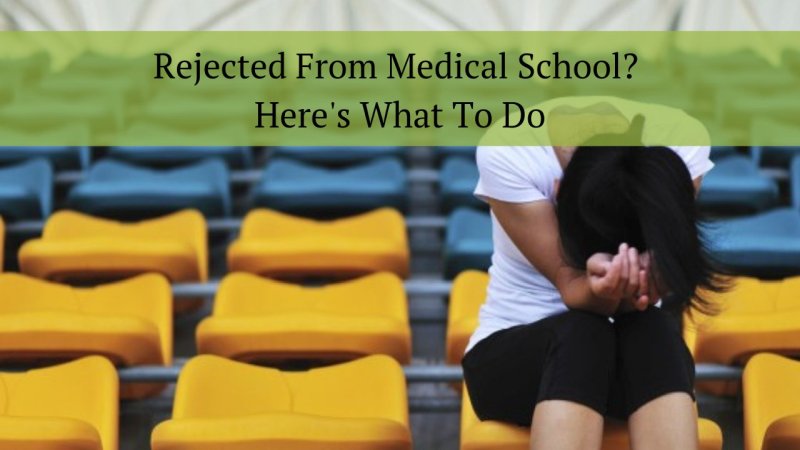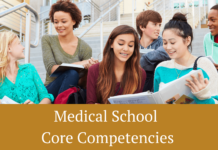
Discover how to improve your medical school candidacy when you reapply!
Every year we talk to medical school applicants who feel confused and in the dark about why they have been rejected from medical school. They do not understand what went wrong or what needs to done differently when they reapply. If you are in this boat, you are not alone! Approximately 60% of medical school applicants are rejected every year.
Whether you are a premedical student trying to make sure to “do everything right” or a medical school applicant who has not yet been accepted to medical school, it may help to learn what applicants who are not accepted to medical school often have in common. Many of these problems are easy to avoid while others take a little more time and effort to remedy.
Some questions we will answer here:
- Can I use the same medical school personal statement?
- Where should I apply to medical school?
- Do I need new medical school letters of recommendation?
- Do I need to improve my GPA?
- What about retaking the MCAT?
The good news is that we have worked with many successful medical school reapplicants. In fact, this is a topic I have been writing about since 2012.
Let’s explore what you can do to decrease your stress and improve your chances of getting accepted to medical school the next application cycle!
Why Medical School Applicants are Rejected
First I want to present the facts to make you feel better! Many first time applicants to medical school are not accepted. Getting rejected doesn’t mean your chances of practicing medicine are nil. According the Association of American Medical College, in 2023-2024, there were a total of 52,577 applicants. Approximately 75% of these were first time applicants and approximately 25% were repeat applicants (the AAMC does not indicate how many times an applicant has reapplied, however.)
Unfortunately, the AAMC does not publish what percentage of reapplicants are accepted to medical school. Anecdotally I can tell you that our reapplicants do very well if they are able to “fix” what they did wrong on an initial application. Assuming you have a competitive GPA and MCAT as well as great extracurriculars, there is no disadvantage to be a reapplicant.
In many cases, the reasons for rejection are fairly easy to identify. Therefore, remain calm and logically evaluating what went wrong, or what could be done better, will improve the odds of acceptance and future success.
Related Article: State Medical School Information
There are six main problems that may result in a medical school rejection:
- You submitted a narrow school list because you were not sure where to apply to medical school.
- You lacked experience in research, clinical exposure or community service/advocacy work.
- You submitted a medical school personal statement or work and activities entries that didn’t tell your story effectively.
- You applied with a low GPA or MCAT.
- You submitted a late AMCAS application.
- Your medical school interview didn’t go well.
Next we will discuss each of these common errors.
Let the former medical school admissions officer experts at MedEdits help you with your medical school application materials. We’ve worked with more than 5,000 students and 94% have been admitted to medical school.
Need Help With Your Application Materials?
Table of Contents
1) Applying to a Narrow Range of Medical Schools
Everyone has told you that you are a great applicant and you should have no concerns. Premed advisors, friends, and family may advise you to reach high and that you don’t need to apply to more than 20 medical schools. We advise most students to be wary of this advice.
While we always encourage medical school applicants to “aim high” and to have dream schools in mind, being realistic is also important. The competition for medical school admissions is fierce; fewer than half of more than 50,000 applicants matriculate every year. Unless you have outstanding grades, MCAT scores, letters of reference, experiences, written application materials, and a great interview experience, it is extremely important to cast a wide net and to apply broadly to a large range of medical schools. Consider reading my popular article: Easiest Medical Schools to get into.
Sometimes applicants (or their advisors) overestimate their competitiveness and apply to mostly top-tier medical schools. These applicants are then surprised when they are not accepted to any of them. The bottom line is that, even if you are a top-notch applicant, you must consider applying to medical schools that are not ultra-selective.
You should consider where to apply to medical school based on your GPA and MCAT, state residency, and other factors that might impact your candidacy. It is okay if you apply to the same medical schools you applied to previously, but, you will to add medical schools to that list and possibly subtract some if you did not apply within your reach.
2) Lacking Clinical, Research, or Community Service Experience
You are applying to medical school, right? Then you must be able to demonstrate to the admissions committee that your experience fits this career decision. Many medical school applicants are interested in science and, while research is important, it cannot substitute for clinical exposure.
Some medical school applicants submit applications with an impressive list of accomplishments and experiences but don’t demonstrate any clinical exposure, which comes in many forms: You can shadow your own family physician, volunteer in a free clinic or a hospital, or participate in a formal premedical program that includes time spent with physicians. It is very tough to convince an admissions committee via your written documents or during interviews that you want to pursue a career in medicine if you have never spent time in a clinical arena.
Contrary to popular belief, however, you do not need paid clinical experience to be accepted to medical school. Many of our students who are accepted to top medical schools, so not have paid clinical experience.
Something that is a requirement in 2025, is working with different populations, understanding healthcare inequities, and being an advocate for those who don’t have resources.
As you can see from the past experiences of applicants accepted to Harvard Medical School, Columbia Medical School, and UT Southwestern Medical School to name a few, clinical exposure, research, and community service should be considered unofficial medical school requirements!
While it is okay to send the same letters of reference from a previous admissions cycle, you should also add on to that letter profile, if possible, to showcase what you have achieved since your first application cycle. These additional letters can be written by professors, principal investigators, or other supervisors.
Related Article: Successful Med School Personal Statement Examples
3) Submitting a Poor Medical School Personal Statement or Work and Activities Entries
Regardless of your candidacy’s strengths, composing persuasive application materials is essential for success. Whether you are a competitive applicant seeking acceptance to the most prestigious medical schools in the country or a “borderline” applicant with lower than average grades, experiences, or MCAT® scores, your experience descriptions and personal statement must convince the people reviewing your application that you are worthy of an interview and an acceptance.
This is especially important during the first stage of the medical school admissions process when the admissions committee decides whether or not to extend an interview invitation. The committee bases this decision on the objective material you present such as your academic profile, but your written materials, including your application and letters of reference, is what determines the reviewer’s decision to extend an interview or not.
You don’t have control over the content of your LORs, but you do have complete control of what you write in your application materials. Written documents that clearly and articulately express the evolution of your interest in medicine with introspection and thought are more likely to motivate the admissions committee to click the “interview” box when deciding your fate.
Just this year we worked with one reapplicant who had exceptional experiences and strong grades and MCAT scores. Sadly, she worked with one of our competitors last year who misguided her with regards to what she should highlight in her written work. By simply telling her story in a more authentic and genuine fashion, she went from no interviews last season to four U.S. allopathic medical school acceptances by the new year.
Take home lesson – when you reapply to medical school you should write a new medical school personal statement that tells an interesting and compelling story to capture the admissions committee’s attention.
Related Article: Best Medical Schools by State
4) Having a Lackluster Academic Profile
You have done “okay” in college and on your MCAT®, but is your performance strong enough to gain admission to medical school? Many medical school admissions committees “screen” applications; if your grades or MCAT® don’t reach a certain threshold, you are automatically rejected and your application isn’t reviewed.
Other medical schools use a school-specific “formula” that takes into account your grades and MCAT® score and determines whether or not your application will be reviewed if you earn a minimum score. The general rule of thumb is that you must have an overall undergraduate grade point average (UGPA) of 3.5 with a strong performance in the sciences and a minimum MCAT® score of 510 to gain admission to medical school, but this rule has variations.
For example, if your UGPA is lower than a 3.5, your MCAT® is a 521 and you have outstanding LORs, documents, and interview skills (see below) you can still gain admission to medical school. It is interesting to view the aggregate data from the AAMC to see what percentage of applicants with certain GPAs and MCATs are accepted to medical school. You will see that 17% of applicants with MCATs of 517 or higher are not accepted to medical school.
Medical schools also take in to account the rigor of your academic course load, undergraduate institution competitiveness, outside pressures (such as financial difficulties), and upward grade trend when evaluating how you performed. Many students perform poorly as a freshman in college and as they adjust to college life their grades steadily increase as they improve their study and time management skills; admissions committees consider this.
If you are rejected by medical school and decide that your academic record needs to be enhanced, you have many options. If grades are the issue, consider taking upper division classes at a four year university after graduation.
Postgraduate special master’s programs specifically designed for students who need academic enhancement and want to attend medical school are also a good alternative; a searchable database of such programs is available from the Association of American Medical Colleges.
Other possibilities are to pursue a master’s in public or global health or in a specific scientific discipline in which you are interested. These are all great options if you need to improve your academic profile. If your MCAT® is the concern, you must critically evaluate what you need to do to improve so you can target your studying.
5) Submitting a Late Application
Did you apply through multiple medical school application systems? When did you submit each application? Did you have a strategic medical school application timeline?
You are an outstanding applicant but submitted a late application. Though this problem is easy to “fix,” you should understand why it’s important to rectify it. Every year the American Medical College Application Service® (AMCAS®) starts accepting medical school applications in late May. Submitting your primary application as close to this opening date as possible is essential. Why? AMCAS® must review and verify your application, which can take up to six weeks (or more if there is a problem), and medical schools will review your application only after you are “verified” and they have received all supplemental application materials, such as letters of reference, Medical College Admissions Test (MCAT®) scores, and secondary applications and essays.
TMDSAS actually breaks down the interview data based on application submission date (AMCAS and AACOMAS do not offer this data). 38% of applicants who submit a TMDSAS application in June receive medical school interviews versus 7% of applicants who submit in August. 86% of interview slots were taken by applicants who submitted by July 31st!
By submitting an early application you will be considered within a smaller pool of applicants early in the season. In contrast, applicants who wait until deadlines to submit their application materials are typically considered within a much larger pool of applicants. In addition, because early applicants have been invited for some of a school’s finite number of interviews, those who apply late are competing with a large number of applicants for fewer interview slots.
Similarly, for medical schools with rolling admissions, interviewing late in the admissions season is less than ideal since in March or April, for example, most initial acceptance offers have been extended. This means that even if you are a competitive applicant, the medical school may not have any more interviews or acceptances to extend. This is why many great applicants who submit late applications, receive “hold”, ‘reject,” or “wait list” decisions rather than acceptances.
6) Demonstrating Poor Interview Skills
Once an applicant reaches the interview stage, the interview is the most important determinant of success. Typically, interviewees with great interpersonal skills and emotional intelligence are naturally better interviewees than applicants who are more introverted. Applicants who are very nervous, not articulate, or who aren’t comfortable speaking about themselves can under-perform during the interview.
Even though some US medical schools are adopting the multiple mini interview (MMI) format, most medical schools still conduct one-on-one interviews. Contrary to what most medical school applicants believe when they start this process, medical school interviews are typically relaxed dialogues; the interviewer is trying to get to know each applicant, assess if he or she has the qualities and characteristics the school is seeking in medical students, and if he is a good fit for the school.
While a certain degree of subjectivity influences every interview experience, applicants can perform well if they practice speaking about themselves before the interview and if they clearly express their motivations and experiences that influenced their decision to practice medicine.
Final Thoughts: What To Do Next
Every year MedEdits works with applicants who were rejected from medical school. We understand how devastating and disappointing this can be. However, we also know that these situations can be turned around with careful analysis about what the applicant did wrong or could improve with a reapplication. We work with many reapplicants who get in to great medical schools when they reapply so have hope!
Ready to analyze what you should do to improve your reapplication? Sign up for a free consultation.






